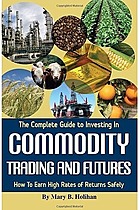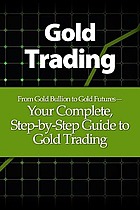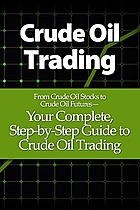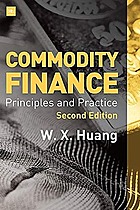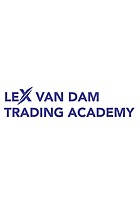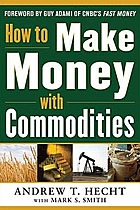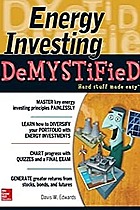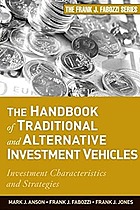
Commodity
Commodities are a distinct asset class with returns that are largely independent of stock and bond returns. Commodities are raw materials used to create the products consumers buy, from food to furniture, to gasoline or petrol. The market distinguishes between two categories of commodities: hard commodities, which includes energy and metals, and soft commodities, which are agricultural assets like corn and wheat. Commodity prices often follow inflation, which makes them appealing to investors looking to diversify their portfolios. They can and have offered superior returns, but they still are one of the more volatile asset classes available.
Experts - People
Aaron Brown
Aaron Uitenbroek
Adam Golden
Adam Kobeissi
Adam O'Dell
Adam Rozencwajg
Agustin Lebron
Alex Hoeptner
Alex Kruger
Alexander Campbell
Alexander Stahel
Amelia Bourdeau
Amine Bouchentouf
Amlan Roy
Amy Jaffe
Andrea Gentilini
Andrea Paltrinieri
Andreas Clenow
Andrew Abraham
Andrew Beer
Andrew Saunders
Andrew Schneider
Andy Hecht
Andy Schectman
Anton LeRoy
Ari Paul
Ari Pine
Audra Plageman
Barclay Leib
Barry Bannister
Bart Melek
Basil Karatzas
Ben Chrnelich
Ben Morris
Benoit Bosc
Bill Blain
Bill Poulos
Bill Shaw
Bo Zhang
Bob Lang
Bob McNally
Bob Yawger
Bobby Jain
Brett Friedman
Brett Tejpaul
Brian Kelly
Brian Shannon
Brian Werdesheim
Brien Lundin
Bruce Kovner
Bruce Mumford
Bud King
Callum Thomas
Carley Garner
Carlos Sanchez
Charlie McGarraugh
Charlie Morris
Chen Zhao
Chris Berry
Chris Blasi
Chris Castroviejo
Chris Powell
Chris Tyrer
Chris Vermeulen
Christophe Ollari
Courtney Smith
Dan Ferris
Dan Jerrett
Dan Morehead
Dan Oliver Jr.
Dan Passarelli
Dan Russo
Dan Tapiero
Daniel Ahn
Daniel Lacalle
Daniel Masters
Daniel Yergin
David Berns
David Dorr
David Morgan
David Shimko
David Truffelman
Davis Edwards
Denise Shull
Dennis Chen
Dennis Gartman
Diego Parrilla
Divya Narendra
Dominic Frisby
Dominique Dwor-Frécaut
Don Singletary
Donald van Deventer
Douglas Borthwick
Dwight Anderson
Ed Woodford
Elliott Allswang
Emad Mostaque
Eric Crittenden
Erik Bethel
Erik Lytikainen
Euan Sinclair
Francis Hunt
Frank Holmes
Fredrik Nerbrand
Galen Burghardt
Gareth Soloway
Geoff Marcus
George Kleinman
George Milling-Stanley
George Pruitt
Gianna Bern
Gina Sanchez
Grace Rodriguez
Greg Diamond
Greg Weldon
Guy Cerundolo
Guy Keller
Henry Ma
Henry McPhie
Howard Klein
Hugo Philion
Humayun Sheikh
Ian Bezek
JG Savoldi
JM Mognetti
Jack Farchy
Jake Chervinsky
Jake Weber
James Helliwell
Jamie Coutts
Jared Dillian
Jason Goepfert
Jason Raznick
Javier Blas
Jay Soloff
Jeff Berwick
Jeff Clark
Jeff Currie
Jeff Fischer
Jeff Fratarcangeli
Jeff Kennedy
Jeff Kilburg
Jeff Sprecher
Jeff deGraaf
Jeffrey Sherman
Jemma Green
Jeremy Schwartz
Jeroen Blokland
Jesse Livermore
Jim Martens
Jim Rogers
Jim Simpson
Jim Sinclair
Joe Raia
John Doody
John Embry
John Kosar
John Murphy
John Palmer
John Stephenson
Jon Najarian
Jonas Thulin
Jonathan Cohen
Jonathan Goldberg
Jonathan Treussard
Jordan Kotick
Joseph Sheeley
Joseph Trevisani
Josh Crumb
Josh Sterling
Josh Young
Julian Brigden
Justin Spittler
Justin Carlson
Justine Underhill
Kathy Derbes
Kathy Jones
Keith Black
Keith Dicker
Kelley Wright
Kevin Davey
Kimberly Flynn
Kirill Zagalsky
Kristen Capuano
Larry Lepard
Larry Williams
Lars Seier Christensen
Lawrence Lewitinn
Leigh Goehring
Leo Kolivakis
Lewis Johnson
Lex van Dam
Lobo Tiggre
Louis Bacon
Lyn Alden
Magdalena Polan
Maleeha Bengali
Marc Chaikin
Marc Cohen
Marcelo Lopez
Marin Katusa
Mario Lima
Mark Hansen
Mark Ritchie
Mark Sebastian
Mark Valek
Mark Whitmore
Mark Yaxley
Markus Heitkoetter
Martin Pring
Marvin Barth
Matt Insley
Matthew Hart
Matthew Waz
Matthias Knab
Maziar Minovi
Meb Faber
Michael Ashton
Michael Barrington-Hibbert
Michael Covel
Michael Defosse
Michael Gettings
Michael Kahn
Michael Kao
Michael Oliver
Mike Cagney
Mike Creadon
Mike Maloney
Mike Rothman
Mish Schneider
Mish Shedlock
Neil Schofield
Nick Hammer
Niels Kaastrup-Larsen
Nigam Arora
Ole Hansen
Patricia Hemsworth
Patrick Watson
Peter Albano
Peter Brandt
Peter Goodburn
Peter Lacalamita
Peter Sainsbury
Peter Schiff
Phil Taylor-Guck
Philippe Khuong-Huu
Pippa Malmgren
R. Martin Chavez
Ram Ahluwalia
Randy Smallwood
Ray Merriman
Rebecca Patterson
Richard Dennis
Richard Sandor
Rick Pendergraft
Rick Rule
Rishi Narang
Robert Balan
Robin Griffiths
Robin Wigglesworth
Roger Montgomery
Ron Rowland
Ronnie Stoeferle
Rory Johnston
Russell Wild
Ruth Barrons Roosevelt
Saker Nusseibeh
Scott Acheychek
Scott Anderson
Scott Irwin
Scott Skyrm
Scott Slayton
Sean Brodrick
Sean Hyman
Shawn Hackett
Sheldon Natenberg
Siddhartha Jha
Slobodan Jovanovic
Stephen Bigalow
Stephen Leeb
Steve Hanke
Steve Kaczmarek
Steve Miley
Steven Hawkins
Sudhu Arumugam
Taimur Baig
Tariq Dennison
Toby Loftin
Todd Edgar
Todd Harrison
Todd Silaika
Tom Busby
Tom Gentile
Tom Hutchinson
Tony Greer
Tony Saliba
Tor Svelland
Tracy Shuchart
Tuomas Malinen
Van Tharp
Victor Niederhoffer
Victor Sperandeo
Viktor Shvets
Vince Sarullo
Warren Pies
Willem Middelkoop
William Gann
Xavier Rolet
DIFFERENT CLASSES
Metals.
Gold, Silver, Platinum, Aluminum, Copper, Palladium.
Crude Oi, Natural Gas, Heating Oil, Gasoline, Coal.
Agriculture.
Wheat, Corn, Soy, Rubber, Timber.
Livestock.
Live Cattle, Lean Hogs, Feeder Cattle, Pork Cutouts.
BENEFITS OF COMMODITIES
Historically, commodity funds have had low correlation with stock market movements, which makes them a valuable source of diversification in a portfolio.
Protection Against Inflation.
Commodity prices tend to rise with inflation, making commodities one of the few assets that benefits from inflation.
Potential Financial Growth.
Commodity prices rise and fall in tandem with supply and demand. The more a commodity is in demand, the higher its price will rise, delivering higher profits to the investor.
Physical Ownership.
This is the most basic way to invest in commodities. Owning these types of commodities is usually best left to those who will be turning that commodity into a finished product.
Future Contracts.
Futures originated as a way for farmers to set a price for future delivery of goods. Buying and selling futures contracts requires skill and experience.
Individual Securities.
Shares of commodity-producing companies grant you indirect access to the commodity markets. If the commodity rises in price, the companies producing that commodity may experience increased revenues and profits.
Mutual Funds, ETFs, and ETNs.
These securities can provide you wide exposure with relatively low investment minimums. Funds can be specific to a particular commodity, such as gold or precious metals, or cover a broader array of commodities.
Hedge funds or private investments specializing in commodities are an option. These are highly speculative and leveraged investment strategies, carrying a high degree of risk and volatility.





























































































































































































































































































































































